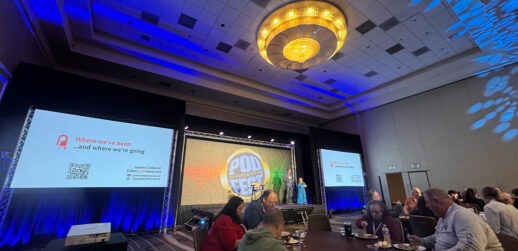As headlines in mass media warned of new cases of novel coronavirus (COVID-19) in the United States and big companies such as Google and Facebook announced cancellations of major user conferences, Mark Herrera, director of education and life safety with International Association of Venue Managers (IAMV) had a tough decision to make.
His group represents thousands of venue managers at stadiums, convention centers and public spaces around the world. Those members need the most updated information on the topic of keeping attendees safe from all pathogens, and his annual, weeklong Academy for Venue Safety and Security, scheduled to start Mar. 1, was the perfect place to deliver that information.
But was it safe to ask 130 people to fly to Las Vegas and sit together to learn the latest on this viral topic? And would they come?
Don’t Overreact or Underreact
In the weeks leading up to the training, Herrera held ongoing conversations with registered students, experts, his team and the venue, Renaissance Las Vegas Hotel. Ultimately, he decided going ahead with the gathering was the best course of action.
“Our job is not to overreact or underreact,” he said. “We give our members the information they need to be safe.”
The adjustment he made was to focus on collecting the most current and factual information possible on the virus and to present it as a resource within the curriculum of conducting risk assessments and procedures. He experienced no fall-off in attendees due to coronavirus concerns.
See also: Planners Proactively Address Coronavirus Outbreak
“When our community faces a health issue, natural disaster or other emergency, we have a meaningful opportunity to reflect on how we collectively manage through these occurrences,” he said.
Herrera is also moving ahead with plans for VenueConnect2020, an annual meeting for more than 2,000 people in Long Beach, California, in August. He is turning the resources he is collecting through an industry advisory group that includes the Centers for Disease Control and Prevention (CDC) into content he can share at events and on the association’s website (see sidebar).
No Handshake Policy

Another group that made the decision that the show must go on is the joint CONEXPO -CON/AGG and International Fluid Power Exposition conference, which takes place every 3 years in Las Vegas and will bring more than 100,000 to Las Vegas Convention Center March 10-14.
While some international companies have cancelled exhibit space for CONEXPO-CON/AGG due to company travel restrictions (44,950 sq. ft. as of March 6), 15,000 was resold, according to Association of Equipment Manufacturers President Dennis Slater. No major exhibitors have cancelled.
Total registration is more than 120,000 and climbing. “We know customers are committed to attending the show in numbers and they are expecting to see and purchase equipment from the manufacturers of the best equipment in the world,” said Slater.
Safety measures being added include access to hand sanitizer and a no-handshake policy.
Stay Calm and Communicate Responsibly
Also moving forward with planning is IMEX Group, which is full-steam-ahead for its Frankfurt, Germany, hosted-buyer event in May. “We currently have no plans to postpone or cancel our show, despite some major events cancelling across Europe in the past few days,” said CEO Carina Bauer in a statement on the event website.
Like the rest of the travel industry, she is monitoring the situation by listening to experts, international health authorities and partners.
More: How Coronavirus Is Affecting a Meeting Near You
“We feel strongly that it is our collective responsibility to focus on the facts, and to act with common sense and sound judgement, taking the advice of the relevant authorities and scientists,” she said.
Gloria Guevara, president and CEO of World Travel & Tourism Council described the struggle to put the risk into proper perspective this way: “Containing the spread of unnecessary panic is as important as stopping the virus itself.”
Bauer also echoed words of advice from International Congress and Convention Association: “In general, it is good practice in situations like these to stay calm, communicate responsibly and follow official health and travel advice.”
Editor’s Note: On March 11, Bauer cancelled IMEX Frankfurt based on the German health minister’s ban on events with more than 1,000 people and that “we cannot guarantee…a large-scale, high quality hosted buyer program.”
A Pandemic of Fear
Mike Dominguez, president and CEO of Associated Luxury Hotels International, has also been talking to meeting professionals about the importance of listening to authorities about what is safe. “There are zero travel warnings in the U.S. and yet people are cancelling meetings there,” he said. “We need to listen to the real experts to understand what is actually happening versus the hysteria.”
Dominguez pointed out that the risk assessment for most of the world remains very low, according to World Health Organization, except for a small segment of the population—those already struggling with chronic conditions or who are fragile due to age. He contrasted the risk of contracting the virus (1 in 100,000) to the risk of being struck by lightning (1 in 3,000). The 3,000 deaths that have been reported globally are still a small fraction of the 650,000 that are attributed to influenza (the flu) each year.
Timing also plays a role in planner decisions. The “epidemic curve” of new cases peaked quickly in China and has been receding since mid-February. Most predict the same pattern will follow in other countries.
Dominguez acknowledged that, often, meeting planners aren’t the ones pulling the plug. At large companies, risk managers make the call, and the planner is forced to undo years of contracts in a day without the benefit of triggering force majeure clauses in their contracts—because attendees could still make the trip in most cases.
Pandemic Influenza Operational Review Worksheet
The following resource was developed by Department of Homeland Security and IAVM and is available in the COVID-19-outbreak-resources page of the group’s website.
- Create a pandemic team to develop and execute influenza response plan.
- Involve employees, labor representatives, and state and local health organizations.
- Develop a venue-specific influenza response plan through Department of Homeland Security, CDC, state and local guidance.
- Establish relationships with emergency response and health care/hospital facilities.
- Identify key employees and cross-train for continuity of operations.
- Establish communications plan for staff, suppliers and contractors.
- Identify key suppliers and contractors.
- Review supply inventories, coordinate shipments and workforce arrangements during pandemic influenza.
- Review critical equipment (HVAC, fire pumps, emergency generator) maintenance schedule to ensure operations.
- Review venue contracts to allow event postponement or cancellation based on “triggers” (e.g., venue staff level, state/local health departments’ closure recommendations, alternative operations).




